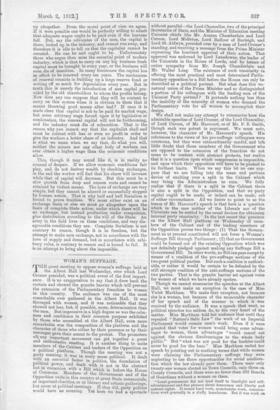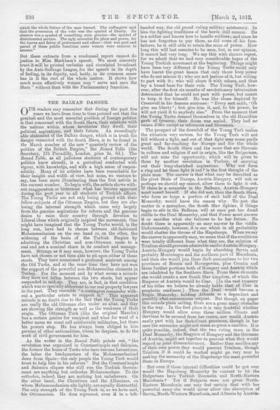WOMAN'S SUFFRAGE.
T"great meeting to oppose woman's suffrage held at the Albert Hall last Wednesday, over which Lord Cromer presided, was a political event of the first import- ance. It is no exaggeration to say that it drew back the curtain and showed the granite barrier which will prevent the extension of the Parliamentary franchise to women in this country. The audience was one of the most remarkable ever gathered in the Albert Hall. It was thronged with women, and it was noticeable that they showed not less, but, if possible, more, determination than the men. But impressive in a high degree as was the calm- ness and confidence in their common purpose exhibited by those who assembled at the Albert Hall, even more remarkable was the composition of the platform and the character of those who either by their presence or by their messages gave their assent to the protest. The promoters of any important movement can get together a great and enthusiastic meeting. It is another thing to unite members of the Cabinet and leaders of the Opposition on a political platform. Though the meeting was not a party meeting, it was in every sense political. It dealt with an essential factor in politics, the foundation of political power, and dealt with it not in the abstract but in connexion with a Bill which is before the House of Commons. Members of the Government and of the Opposition unite in this country at great State ceremonials, at important charities, or at literary and artistic gatherings, but never at political meetings. If they did, party politics would have no meaning. Yet here we had a spectacle without parallel—the Lord Chancellor, two of the principal Secretaries of State, and the Minister of Education meetin g Unionist chiefs like Mr. Austen Chamberlain and Lord Curzon, Lord Midleton, Lord Balfour of Burleigh, and Lord St. Aldwyn, presided over by a man of Lord Cromer's standing, and receiving a message from the Prime Minister expressing the heartiest approval of their action. That approval was endorsed by Lord Lansdowne, the leader of the Unionists in the HOMO of Lords, and by letters of entire sympathy from Mr. Joseph Chamberlain and Mr. Walter Long. The existence of such unanimity in offering the most practical and most determined Parlia- mentary opposition to a Bill before the House can only be described as a political portent. But what does this un- natural union of the Prime Minister and so distinguished a portion of his colleagues with the leading men of the Unionist Party portend P It portends nothing less than the inability of the minority of women who demand the Parliamentary vote for all women to accomplish their design.
We shall not make any attempt to summarize here the admirable speeches of Lord Cromer, of the Lord Chancellor, of Lord Curzon, of Mr. Harcourt, or of Mr. F. E. Smith, though each was potent in argument. We must note. however, the character of Mr. Harcourt's speech. His references to the views of his pro-suffrage colleagues were courteous, but they were extraordinarily candid, and loft little doubt that those members of the Government who are opposed to the extension of the franchise do not mean to be content with abstract protests, but realize that it is a question upon which compromise is impossible, and upon which their opposition will have to be pushed to its furthest limits. When we say this let no one sup- pose that we are falling into the mean and partisan device of exulting over a split in the Cabinet which may bring the Administration to ruin. We fully realize that if there is a split in the Cabinet there is also a split in the Opposition, and that no party capital ought to be made, or indeed can be made, out of either circumstance. All we desire to point to as the lesson of Mr. Harcourt's speech is that here is a question which in the case neither of the Liberals nor of the Unionists can be settled by the usual devices for obtaining internal party unanimity. In the last resort the presence on the Albert Hall platform on Wednesday of mem- bers of the Cabinet and. of the leading members of the Opposition proves two things : (1) That the Govern- ment as at present constituted will not force a Woman's Suffrage Bill through Parliament ; (2) that no Government could be formed out of the existing Opposition which was not definitely pledged against making any Suffrage Bill a Government Bill. In other words, no Bill can pass except by means of a coalition of the pro-suffrage sections of the two great political parties. But such a coalition is unthink- able, or rather it would be certain to be defeated by the still stronger coalition of the anti-suffrage sections of the two parties. That is the granite barrier set against votes for women of which we have already spoken.
Though we cannot summarize the speeches at the Albert Hall, we must make an exception in the case of Miss Violet Markham. We make that exception, not because she is a woman, but because of the memorable character of her speech and of the manner in which it was received by the audience. It was a speech that went, as political speeches too seldom do, to the very heart of the matter. Miss Markham told her audience that until they repealed "Nature's Salle Law" the work of an Imperial Parliament would remain men's work. Even if it were granted that votes for women would bring some advan- tages to women, those advantages 'would cancel out against the obvious disadvantages to the whole body politic." But "what was not good for the beehive could never be good for the bees." Miss Markham ended her speech by pointing out in scathing terms that while women were claiming the Parliamentai7 suffrage they were neglecting to use those opportunities for social ameliora- tion which the law already gave them. There were only twenty-one women elected on Town Councils, only three on County Councils, and there were no fewer than 232 Boards of Guardians without a woman on them.
"Local government did not lend itself to limelight and self- advertisement and fine phrases about democracy and liberty and natural rights. It meant hard work, monotonous work, conscien- tious work generally in a stuffy boardroom. But it was work on
which the whole future of the race turned. The suffragists said that the possession of the vote was the symbol of liberty. Its absence was a symbol of something even greater—the symbol of disinterested service. The ugly scramble for place and power, for the loaves and fishes of preferment and offices—that was part and parcel of these public functions some women were anxious to
assume."
But these extracts from a condensed report cannot do justice to Mies Markham's speech. We most sincerely trust it will be printed verbatim and circulated broadcast by the Anti-Suffrage League, for the speech in its depth of feeling, in its dignity, and, lastly, in its common sense has in it the root of the whole matter. It shows how much more effectively women may" serve and save the State" without than with the Parliamentary franchise.











































 Previous page
Previous page